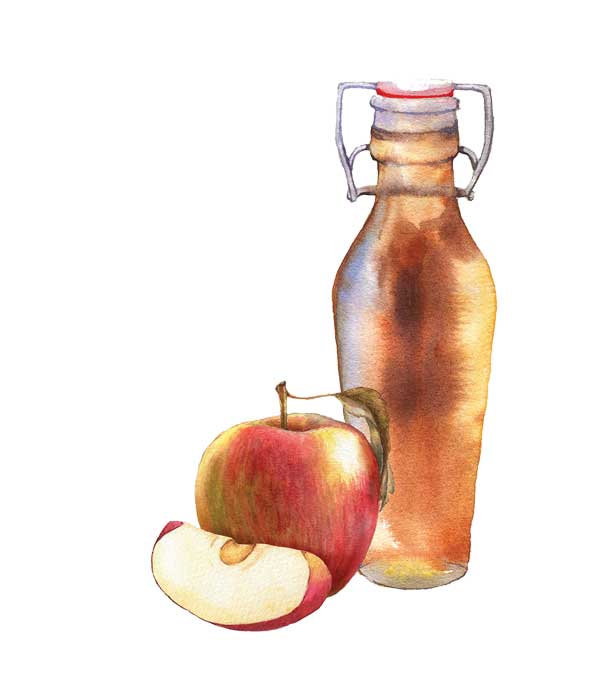 Apple cider vinegar is a form of vinegar made by fermenting the sugar from apples. While it is not a substantial source of macronutrients, apple cider vinegar contains acetic acid, B vitamins, polyphenols, vitamin C, and a small amount of potassium.1–4 Some brands of apple cider vinegar contain the “mother,” a probiotic composed of bacteria and yeast that gives the vinegar a cloudy appearance.2–4 Apple cider vinegar has been purported to have several positive effects on health, but be wary of these claims, as many are not supported by sufficient scientific evidence.
Apple cider vinegar is a form of vinegar made by fermenting the sugar from apples. While it is not a substantial source of macronutrients, apple cider vinegar contains acetic acid, B vitamins, polyphenols, vitamin C, and a small amount of potassium.1–4 Some brands of apple cider vinegar contain the “mother,” a probiotic composed of bacteria and yeast that gives the vinegar a cloudy appearance.2–4 Apple cider vinegar has been purported to have several positive effects on health, but be wary of these claims, as many are not supported by sufficient scientific evidence.
Potential Health Benefits
Several small studies have indicated that apple cider vinegar might aid in lowering blood glucose levels after a meal, which could be particularly beneficial for individuals with Type 2 diabetes.2–5 Additionally, one small study indicated that consuming two tablespoons of apple cider vinegar at night could result in reduced fasting blood glucose levels the following morning.2,4 Individuals should not take apple cider vinegar in lieu of medications for Type 2 diabetes.1,3 Furthermore, the combination of antidiabetic medications and apple cider vinegar might cause blood glucose levels to become too low.1
Apple cider vinegar may help lower cholesterol as well. Animal studies have shown that apple cider vinegar can improve total cholesterol levels, increase high-density lipoprotein (HDL, or “good” cholesterol) levels, and decrease low-density lipoprotein (LDL, or “bad” cholesterol) and triglyceride levels.4,5 One study found an association between the polyphenols in apples and decreased levels of LDL in healthy human subjects,5 and another eight-week study on 19 patients with hyperlipidemia showed that apple cider vinegar consumption was associated with increased HDL levels and lower levels of LDL, triglycerides, and total cholesterol.2,5
Various studies have suggested that consumption of apple cider vinegar might result in weight loss, potentially due to appetite suppression.2–4 However, the evidence does not demonstrate that apple cider has a clear, significant, long-term benefit on weight loss, and risks associated with apple cider vinegar consumption might outweigh potential benefits.5–8
Overall, it is important to note that while apple cider vinegar might have modest positive effects on health, more research on human subjects and with larger sample sizes needs to be done before any of these claims can be validated.
Potential Health Risks
The claim that applying diluted apple cider vinegar to the skin may help improve skin health has not been supported with sufficient evidence. Studies have demonstrated that topical application of apple cider vinegar did not alter the skin bacterial microbiome9 or improve skin barrier function4 in individuals with atopic dermatitis. Furthermore, apple cider vinegar may irritate the skin of people with atopic dermatitis4 and cause chemical burns in some people.1,4
Long-term consumption of high amounts of apple cider vinegar has the potential to cause health problems. Due to its high acidity, consuming undiluted apple cider vinegar may damage tooth enamel.2,6,8 Consuming apple cider vinegar might result in low levels of potassium, which could be dangerous for individuals with low potassium or those taking medications that can lower potassium (e.g., diuretics, insulin, digoxin).1,7,8 Other potential side effects of apple cider vinegar consumption include nausea and throat irritation.2,7
Bottom Line
Apple cider vinegar might have modest health benefits when taken in small amounts; however, more evidence is needed to validate these findings, and consuming high amounts of apple cider vinegar in the long-term may be harmful.
Sources
- Medline Plus. Apple cider vinegar. Reviewed 14 Apr 2022. https://medlineplus.gov/druginfo/natural/816.html. Accessed 23 Feb 2023.
- Jesner L. Apple cider vinegar nutrition facts and health benefits. VeryWellFit. Updated 22 Jul 2021. https://www.verywellfit.com/apple-cider-vinegar-nutrition-facts-and-health-benefits-5191520. Accessed 23 Feb 2023.
- McDonald E. Debunking the health benefits of apple cider vinegar. University of Chicago Medicine. 23 Aug 2018. https://www.uchicagomedicine.org/forefront/health-and-wellness-articles/debunking-the-health-benefits-of-apple-cider-vinegar. Accessed 23 Feb 2023.
- Gunnars K. 6 health benefits of apple cider vinegar, backed by science. Healthline. Updated 8 Apr 2021. https://www.healthline.com/nutrition/6-proven-health-benefits-of-apple-cider-vinegar#1.-High-in-healthful-substances. Accessed 23 Feb 2023.
- Launholt TL, Kristiansen CB, Hjorth P. Safety and side effects of apple vinegar intake and its effect on metabolic parameters and body weight: a systematic review. Eur J Nutr. 2020;59(6):2273–2289.
- Palmer C. What the science says about apple cider vinegar. GoodRx Health. 27 Jun 2022. https://www.goodrx.com/well-being/diet-nutrition/apple-cider-vinegar-healthy. Accessed 23 Feb 2023.
- Zeratsky K. Drinking apple cider vinegar for weight loss seems far-fetched. Does it work? Mayo Clinic. 29 Apr 2022. https://www.mayoclinic.org/healthy-lifestyle/weight-loss/expert-answers/apple-cider-vinegar-for-weight-loss/faq-20058394. Accessed 23 Feb 2023.
- Shmerling RH. Apple cider vinegar diet: does it really work? Harvard Health Blog. 29 Oct 2020. https://www.health.harvard.edu/blog/apple-cider-vinegar-diet-does-it-really-work-2018042513703. Accessed 23 Feb 2023.
- Luu LA, Flowers RH, Gao Y, et al. Apple cider vinegar soaks do not alter the skin bacterial microbiome in atopic dermatitis. PLoS One. 2021;16(6):e0252272.





